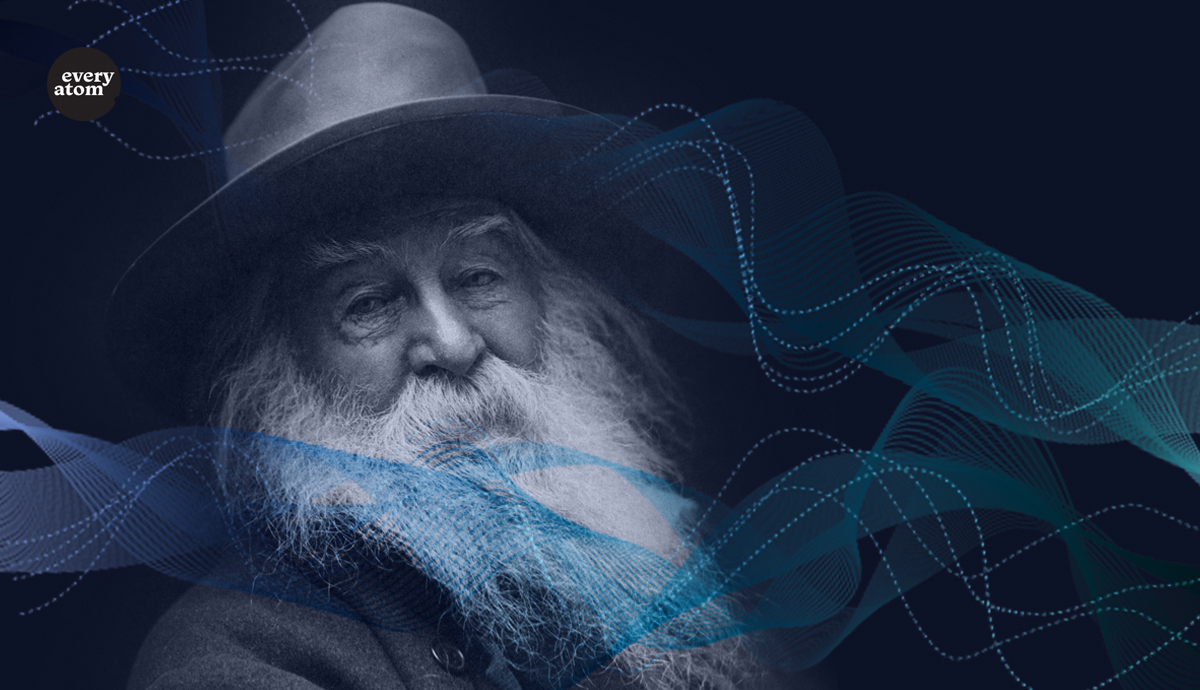Every Atom | No. 173
Introduction to Every Atom by project curator Brian Clements
This is the meal pleasantly set . . . . this is the meat and drink for natural hunger,
It is for the wicked just the same as the righteous . . . .I make appointments with all,
This part of Whitman’s “Song of Myself” has always gripped me in an odd way. It initially appears to be a fairly standard poetic move, as far as Whitman goes: death leading into life, defeat into plenitude, struggle into rest. Those readers of Whitman invested in his still-expanding oeuvre might even find a familiar tale or two embedded here. The story of the sacrifice of “bold sailor” James Lawrence and his iconic death in the War of 1812 (“Don’t give up the ship!”) comes to mind, which is memorialized in the graveyard of New York’s Trinity Church as well as in the center of Whitman’s newly discovered novella Jack Engle. So far, so clear. The term “viva” (long live!), though, has always thrown me off. It is an echo, an auditory index, of something out of place: in this case, Italian or Spanish salutations to the dead of war. So, there may well be more at stake here than a jingoistic celebration of military heroes: After all, Lawrence did not exclaim “viva” and neither did his fellow English-speaking sailors and soldiers. That term was reserved for another group.
Glancing over the newspaper sphere that saw Whitman’s emergence as a writer, we can see how this linguistic loan from the Mediterranean in the 1840s and 1850s became an expression reserved for a somewhat non-specific (but decidedly non-American) Other: it was thundered en masse at Portuguese marshals, embattled Popes, Italian monarchs on horseback, French Emperors and Empresses in splendid dress. Even “German vivas” at republican conventions in exile are recorded. Like the puzzlingly deictic “this” that opens the following stanza (what is “this”—the page? The nation? Death? Failure? All of the above?), Whitman’s vivas to those drowned by history point to a multitude outside of his primary poetic persona. It is the voice of the masses of Europe—voices Whitman encountered assembling in the streets of his own city. After all, their increased presence in New York was in many ways precipitated by a defeat quite close to Whitman’s heart: the failure of the democratic, republican revolutions of 1848.
Not only their voices, but also their causes swept across the ocean. On the busy streets of mid-century New York, Whitman would have run into Hungarians marching with red, white, and green banners while singing the Himnusz in remembrance of the dead of their short-lived Republic, crushed by the Russian Empire. He would have seen the followers of Garibaldi and Mazzini speaking in solidarity for the fellow republicans in Rome overcome by Papal forces. Or would have met exiled German Forty-Eighters, who fled their various states when unification and democratization was defeated by monarchy. Vivas to those who have failed: The stuff of dead Republics, walking the streets of Whitman’s Mannahatta.
Whitman’s Leaves and Whitman’s streets are always also a testament to the failure and the hopes of republicanism. “Song of Myself,” his celebration of the primary building block of popular sovereignty (the individual), was penned at a time when popular government was on the retreat from monarchism across the world. During the long foreground of Whitman’s epic, the poet and journalist penned many outraged articles (and the occasional outraged poem) over the various failures of 1848 on the continent while defending the dignity of its “overcome heroes, and the number-less unknown heroes equal to the greatest heroes known” who now stepped ashore as political and economic refugees in New York harbor.
It is no coincidence, then, that Whitman’s viva to the dead transitions into a passage that would fit quite well at the base of that famous monument that would later in his century take residence in that very harbor (another republican viva of sorts, supported by a donation from the poet). While Whitman himself was at times quite acerbic when it came to certain immigrants—especially the catholic Irish, whom he saw as potentially in cahoots with the theocrat that had put down the Roman Republic—he embraced the idea of immigration as a universal good. His long-fingered “this” points to his America as well as the republican masses washing ashore: each serves the other as “meat and drink for natural hunger”—republican institutions replenished by republican minds and bodies. Failure is a dish well set, creating a stronger multinational republic out of the ruins of 1848.
As the platitude goes, history often rhymes—but Whitman famously didn’t (or at least: he rarely did). He was certainly well aware of what, in 1847, he called “the alarmative, the hue-and-cryative, . . . the air-bubble-ative” that persists today: That xenophobia and distrust, the sense of feeling inconvenienced in one’s plentitude that attracted votes and media attention back then as well as it does now. Everyone is going on and on, Whitman once commented in the Brooklyn Daily Eagle, about “the prospective evil of the ‘paupers and criminals’ of certain portions of Europe being sent over to the shores of our republic, at European expense! —Somebody has heard from somebody—who has heard it from somebody else—that the burgomasters of a little German town have sent over their paupers and criminals this way! And the probability is anticipated that other towns will follow suit! Prodigious probability! Terrible tractorations!” (They're not sending their best. They're bringing crime.) Even if these raw-headed narratives were true, Whitman announced, “let them come and welcome! . . . and the more the better.” Sponger, slave, venerealee. Huddled masses.
Still, Whitman was shrewd enough to realize the weight of anti-immigrant sentiment and the threat it posed to his plea for a multitudinous republic. Failure of his politico-prophetic project, thus, never ceased to be a possibility. Indeed, in celebrating the dead republics of Europe, there is at least a hint in Whitman’s work that vivas to the dead might one day encompass “America”—its egalitarian, republican ideal, if not its conflicted political reality. If ☞ “this” ceases to be a place where one “make[s] appointments with all,” others will one day proclaim viva to it in defiant remembrance of its glorious failure.
Nonetheless, Whitman remained hopeful. In 1888 (six years after the passage of the Chinese exclusion act), he conversed with his future literary executors on the topic. For all his many faults, oversights, antipathies, the poet’s position here remained startlingly clear, universal, without allowances for decades of “air-bubble-ative” tales of immigrant criminality, treachery, and disease:
“America must welcome all—Chinese, Irish, German, pauper or not, criminal or not—all, all, without exceptions: become an asylum for all who choose to come. We may have drifted away from this principle temporarily but time will bring us back. The tide may rise and rise again and still again and again after that, but at last there is an ebb—the low water comes at last.”
Viva!
Recommended
Nor’easter
Post-Op Appointment With My Father
Cedar Valley Youth Poet Laureate | Fall 2024 Workshop







